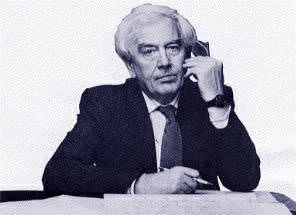 Recent And Reissued Works By Robert Ashley - Chris
Blackford
Recent And Reissued Works By Robert Ashley - Chris
Blackford Recent And Reissued Works By Robert Ashley - Chris
Blackford
Recent And Reissued Works By Robert Ashley - Chris
Blackford
Automatic Writing (Lovely Music LCD 1002 CD) by the highly individual American composer Robert Ashley (b. 1930) has been reissued with two extra tracks, 'Purposeful Lady Slow Afternoon' (1968) and 'She Was A Visitor' (1967). In his fascinating sleevenotes, Ashley explains that the 46-minute 'Automatic Writing' (1979), developed out of an interest in and mild affliction from Tourette's Syndrome; in the composer's case this manifests itself in occasional involuntary speech. Recordings of Ashley's mostly incomprehensible utterances, subjected to electronic treatments, are accompanied by Mimi Johnson's whispered French "translation". Bass tones and organ harmonies hover just above the threshold of audibility, perhaps suggesting the option of adopting an ambient listening strategy; however, listening closely on headphones certainly heightens the work's strangely compelling blend of the surreal and sacred. It also has interesting psycho-acoustic properties - how much is actually there, how much 'hallucinated' by the mind's ear?
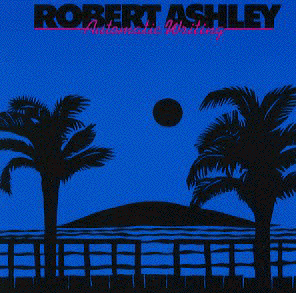 'Purposeful Lady Slow Afternoon' features a woman
describing a sequence of events "without any moral or psychological
interpretation". The narrative, scripted by Ashley, tells of aggressive
deep kissing and fellatio, and attempted oral penetration with a gun, etc.
Is this rape (or even rape fantasy) or perhaps consensual sadomasochistic
game-playing? The woman's detached tone keeps us in a state of moral perplexity,
though this in itself leaves the work open to a possible charge of misogyny.
Composed in the so-called 'permissive' late 60s, when Ashley was a member
of the electronic-theatre group Sonic Arts Union with Behrman, Lucier and
Mumma, it now appears particularly provocative within the current climate
of 'political correctness'. Abundant tape hiss, percussive chimes and electronic
drones also contribute to the troubling atmosphere. Less controversial is
'She Was A Visitor' which, like 'Purposeful Lady', is part of a 60s opera
called That Morning Thing. The title of the piece is repeated by
one speaker while others chant selected phonemes to create a dense wave
of choral textures. It's an intriguing conclusion to this important collection
of reissues.
'Purposeful Lady Slow Afternoon' features a woman
describing a sequence of events "without any moral or psychological
interpretation". The narrative, scripted by Ashley, tells of aggressive
deep kissing and fellatio, and attempted oral penetration with a gun, etc.
Is this rape (or even rape fantasy) or perhaps consensual sadomasochistic
game-playing? The woman's detached tone keeps us in a state of moral perplexity,
though this in itself leaves the work open to a possible charge of misogyny.
Composed in the so-called 'permissive' late 60s, when Ashley was a member
of the electronic-theatre group Sonic Arts Union with Behrman, Lucier and
Mumma, it now appears particularly provocative within the current climate
of 'political correctness'. Abundant tape hiss, percussive chimes and electronic
drones also contribute to the troubling atmosphere. Less controversial is
'She Was A Visitor' which, like 'Purposeful Lady', is part of a 60s opera
called That Morning Thing. The title of the piece is repeated by
one speaker while others chant selected phonemes to create a dense wave
of choral textures. It's an intriguing conclusion to this important collection
of reissues.
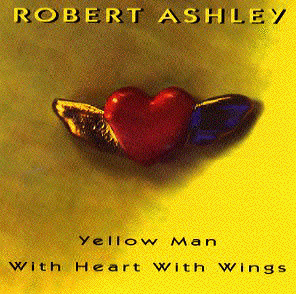 Yellow Man With Heart With Wings (Lovely Music LCD 1003 CD, 1990) comprises two related, yet significantly
different, versions of Ashley's 1978 composition 'Yellow Man With Heart
With Wings'. The 'Spanish' version features Guillermo Grenier reciting Ashley's
text (on a theme of agriculture and the landscape of the mind) in Spanish,
foregrounded against a subdued haze of electronic drones, pulses and washes
of electronically treated vocals; while in the 'English' version Ashley's
treated voice is embedded in the overall sound design, making the words
indistinct (the text is provided though). Like 'Automatic Writing', first
impressions can be deceptive. Ashley's expansive sonic architecture has
a surface calm which belies the intricate microstructural activity happening
just beneath it. His spatial awareness is remarkably refined and, once again,
close listening will reveal the subtlety of its organisation. The 'English'
version unexpectedly builds to a crescendo where the swirling, iridescent
layers become strikingly apparent. Ashley plays all instruments except clavinet
which is played by regular collaborator "Blue" Gene Tyranny.
Yellow Man With Heart With Wings (Lovely Music LCD 1003 CD, 1990) comprises two related, yet significantly
different, versions of Ashley's 1978 composition 'Yellow Man With Heart
With Wings'. The 'Spanish' version features Guillermo Grenier reciting Ashley's
text (on a theme of agriculture and the landscape of the mind) in Spanish,
foregrounded against a subdued haze of electronic drones, pulses and washes
of electronically treated vocals; while in the 'English' version Ashley's
treated voice is embedded in the overall sound design, making the words
indistinct (the text is provided though). Like 'Automatic Writing', first
impressions can be deceptive. Ashley's expansive sonic architecture has
a surface calm which belies the intricate microstructural activity happening
just beneath it. His spatial awareness is remarkably refined and, once again,
close listening will reveal the subtlety of its organisation. The 'English'
version unexpectedly builds to a crescendo where the swirling, iridescent
layers become strikingly apparent. Ashley plays all instruments except clavinet
which is played by regular collaborator "Blue" Gene Tyranny.
The American label Lovely Music is also responsible for
publishing three, more recent works by Ashley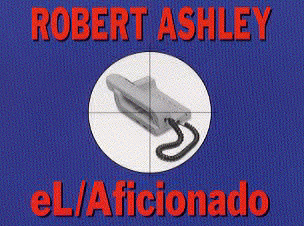 eL/Aficionado (1993) (Lovely Music LCD 1004 CD) is an innovative
opera and, like its predecessors, Perfect Lives
(1983), Atalanta (Acts Of God) (1985) and Improvement (1992)
is a substantial work involving intricate, multilayered sung and spoken
narrative and instrumental lines. Here the libretto's interlocking themes
are espionage and lonely hearts ads. For about 70 minutes the work brilliantly
sustains an air of uneasy calm: misty, microtonal electronics provide a
subtle, low-key backdrop to the vocal parts. Thomas Buckner's light baritone
recitative, and excellent diction, convey uncertainty and repressed fear
with every understated inflexion, while Ashley's distinctive oration is
anodyne, avuncular, yet tinged with a sinister callousness. Jacqueline Humbert
and Sam Ashley portray the other characters with equal aplomb, and not without
a touch of humour. It's another major work which again redefines the nature
of modern opera.
eL/Aficionado (1993) (Lovely Music LCD 1004 CD) is an innovative
opera and, like its predecessors, Perfect Lives
(1983), Atalanta (Acts Of God) (1985) and Improvement (1992)
is a substantial work involving intricate, multilayered sung and spoken
narrative and instrumental lines. Here the libretto's interlocking themes
are espionage and lonely hearts ads. For about 70 minutes the work brilliantly
sustains an air of uneasy calm: misty, microtonal electronics provide a
subtle, low-key backdrop to the vocal parts. Thomas Buckner's light baritone
recitative, and excellent diction, convey uncertainty and repressed fear
with every understated inflexion, while Ashley's distinctive oration is
anodyne, avuncular, yet tinged with a sinister callousness. Jacqueline Humbert
and Sam Ashley portray the other characters with equal aplomb, and not without
a touch of humour. It's another major work which again redefines the nature
of modern opera.
Sign Of The Times (Lovely Music LCD 3022 CD) is five pieces commissioned by the singer Thomas Buckner, including Robert Ashley's 'The Producer Speaks' (1991), the longest work at 25 minutes and in a so-called 'post minimal' style. A simple piano sequence is repeated with subtle variations in dynamics; tension is dramatically built and released at the changing of the chords. Over this, Buckner is free to sing the story (a strained meeting of two mysterious pianists and their impressario or producer), improvising a melodic line suggested by the speech rhythms and emotional tensions of the text. The piano repetition may try the patience of some listeners, but their patience will be rewarded by a work that contains more expressive nuances and energy than at first meets the ear. Other chamber works performed here are composed by Jon Gibson, Annea Lockwood, Leroy Jenkins and Brian Smith.
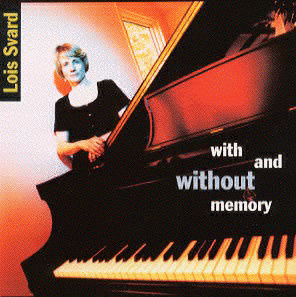 'Van Cao's Meditation' (1992) is also in the
US minimalist tradition, though with Satiesque roots. Ashley was inspired
by a 1989 photograph of Vietnamese composer Van Cao seated at one of that
country's two grand pianos. Pianist Lois Svard is the solo performer on
this collection entitled With And Without Memory (Lovely Music LCD
3051 CD). Ashley's piece, which lasts nearly 38 minutes, involves the extended
repetition of a sequence of single notes. Keys in the bass are held down
silently to allow overtones to resonate and the pianist is permitted to
hum along, which she does with a discreet and pensive charm (no Jarrettesque
ebullience here!). The elusive melodic line has an aura of introspective
mystery, inscrutability even. I've heard it numerous times now but still
can't quite recall (or predict) the intricacies of its undulating progression.
Its abiding freshness, despite repetition, is reminiscent of kindred pieces
like '1/1' on Brian Eno's Music For Airports and, of course, Erik
Satie's pathbreaking Vexations which lasts rather longer at over
18 hours. . . Compositions by "Blue" Gene Tyranny, and William
Duckworth are also featured.
'Van Cao's Meditation' (1992) is also in the
US minimalist tradition, though with Satiesque roots. Ashley was inspired
by a 1989 photograph of Vietnamese composer Van Cao seated at one of that
country's two grand pianos. Pianist Lois Svard is the solo performer on
this collection entitled With And Without Memory (Lovely Music LCD
3051 CD). Ashley's piece, which lasts nearly 38 minutes, involves the extended
repetition of a sequence of single notes. Keys in the bass are held down
silently to allow overtones to resonate and the pianist is permitted to
hum along, which she does with a discreet and pensive charm (no Jarrettesque
ebullience here!). The elusive melodic line has an aura of introspective
mystery, inscrutability even. I've heard it numerous times now but still
can't quite recall (or predict) the intricacies of its undulating progression.
Its abiding freshness, despite repetition, is reminiscent of kindred pieces
like '1/1' on Brian Eno's Music For Airports and, of course, Erik
Satie's pathbreaking Vexations which lasts rather longer at over
18 hours. . . Compositions by "Blue" Gene Tyranny, and William
Duckworth are also featured.
'Post minimal' specialists Relâche Ensemble were one of several commissioners of Ashley's 1992 chamber work 'Outcome Inevitable'. Outcome Inevitable (O.O. Discs 17) is also the title of this collection which includes works by Lois V. Vierk, Eleanor Hovda and Fred Wei-han Ho. Ashley's piece thrives on rhythmic extremes; for 16 minutes the viola sustains a racing, metronomic pizzicato in marked contrast to the slow, soft-focus pulse played by the percussionist. At times almost languorous, the generous, sunlit theme passes from oboe, flute, clarinet, to soprano and alto saxophones with occasional jazz inflexions and buzzing, split tone disturbance. Unlike most of his haunting compositions, which creep up on the listener, revealing the subtleties of their understated soundworlds after a few close hearings, 'Outcome Inevitable' communicates in a surprisingly direct and quickly accessible style conveying a mood which is both reassuring and optimistic.
Robert Ashley is without doubt a major figure in contemporary composition, especially in the field of experimental opera. Such are the imaginative and evocative qualities of his texts - which make satisfying reading in their own right without the music - that he also deserves higher status as a librettist. This selection of reissued and recent works should not be missed. (Lovely Music, 10 Beach Street, New York, NY 10013, USA / O.O. Discs, 261 Groovers Avenue, Black Rock, CT 06605, USA)
This piece was published in Rubberneck 24, June 1997, and is presented here with additional material (February 1999).
Text © Rubberneck; photo of Robert Ashley © Jack Mitchell